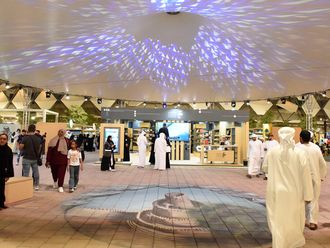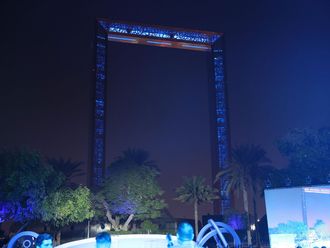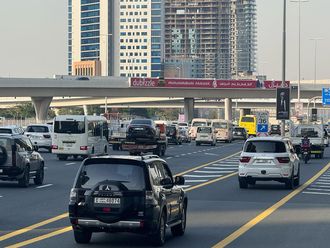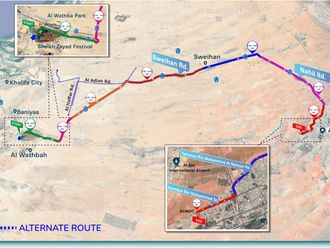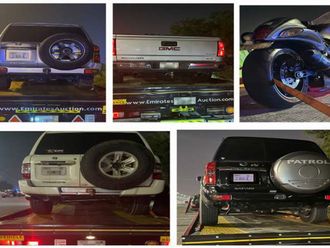When people enter the portals of Zulekha Hospital, Sharjah, it's not only for the excellent, wide spectrum of medical facilities and the down-to-earth fees but on account of their love and admiration for Dr Zulekha Daud – the endearing matriarch and managing director of the 75-bed complex.
This is the woman whose untiring services, first at the Kuwaiti Mission Hospital and, later, at her own clinic since 1963, goes way beyond the call of duty. For her, the job is a sacrosanct mission and her patients part of an extended family. No wonder then that she has gone on to become 'Mama Zulekha' to her patients.
An Indian who left her country's shores 33 years ago, Dr Zulekha is today at home in Sharjah. Her bonds run deep with this country – something which is evident in the manner in which she interacts with her staff and her patients. There is an aura of quiet dignity and compassion around her, and it is easy to understand why, at 63, Dr Zulekha is every inch a legend for the patients and generations of their families treated by her.
She looks back at her experiences in an intimate chats with us...
I belong to Nagpur in India. That is the place where I spent my childhood, completed my schooling, college and, later, my MBBS degree at the General Medical College.
As a child, I was taught that one of the most important things that mattered in life was a good education. My father, Sadiq Vali, was in the construction business and my mother, Bilkis, a housewife. Both did not have an opportunity to receive much education, but that made them even more determined to give their five children the best possible education. I am indebted to them for the their outlook and their efforts. We were three girls and two boys in the family.
I belong to a very orthodox community, and in our times, educating girls wasn't the norm. But it was the persistence of my parents, especially my mother, which gave us this wonderful opportunity. She always taught us to take pride in being who we were and told us there was nothing that girls couldn't do as equally well as boys. She worked on us to do everything in a very methodical manner.
Dr. Zulekha in her office .©Gulf News |
Small things, like good handwriting, well-kept books and neatness mattered to her, and she would never give up until we achieved some degree of perfection in whatever we had set out to do. Thanks to my parents' perseverance, today my siblings and I have achieved distinction in our respective fields. My eldest sister is a paediatrician, and the younger one an educationist from Syracuse University and currently the principal of Ibnsena School, Sharjah.
My eldest brother, completed his law and joined the construction business, while my youngest brother is a civil engineer. In fact, so dogged was my mother in her convictions that she found the confidence to complete her high school as I was completing my medical degree.
We had a lovely childhood and were brought up like little treasures. Our parents gave us a lot of love and never discouraged us from doing anything. We got opportunities to try out various sports, learn music, art, and, above all, meet a lot of people. Their confidence in us made us what we are today. As I completed my schooling, it was evident to me that doctors had a special niche in society and were greatly respected. That is what helped me decide my career.
As soon as I finished my internship and house job in general medicine, gynaecology and obstetrics, my parents arranged for me to marry Dr Iqbal Daud who is an accomplished ophthalmologist. (Today he has his own practice, the Daud polyclinic at Deira.)
It was in late 1962 that he was offered a job at the Kuwaiti Mission Hospital, Kuwait, and suddenly I was faced with the prospect of leaving India. I had mixed feelings, but looked forward to the new experience. We arrived in Kuwait and I was surprised how well organised it was. There were many Indians there and I settled in nicely.
I began working as a GP for the mission hospital. In 1963, I was expecting my first child, and the mission hospital refused to grant maternity leave beyond three weeks. I had sought at least six weeks. When that was rejected, I resigned and moved to the Kuwaiti Mission Hospital in Dubai. I remember the day I arrived – August 12, 1964.
I had mentally prepared myself for a tough life and sent my son, Adil, to my mother in Nagpur, as Dubai did not have any proper schools then. Those days, there was no proper airport or seaport in Dubai. There was a small runway that belonged to the British.
To me, work is worship and when the authorities asked me where I would like to work, I had no reservations as to the choice of place. So they put me in Sharjah. My husband was offered a job at the Kuwaiti Mission Hospital in Dubai and he followed soon after. We used to live in Deira.
It was a tough life but it was very challenging. I have always loved challenges and took this one in the same spirit. Every morning at 7, a Land Rover would come and fetch me from Deira. Those days, there weren't proper roads to Sharjah and the driver would follow a sand track. It took us nearly 40 minutes to reach the Kuwaiti Mission clinic.
Medical research hadn't made such rapid strides. We only had potassium permanganate, some sulphur drugs and penicillin to counteract infections. Tetracycline was just becoming popular and it was also used. The most common infections were malaria, fever, diarrhoea and vomiting.
Sharjah did have electricity but the voltage was so low that fans would drone noisily and slowly without giving much respite from the heat.
Dr. Zulekha with a colleague and a petient in the hospital.©Gulf News |
I had learnt Arabic in Kuwait and this made my interaction with patients, especially women, very comfortable. By afternoon, I would be deposited back in Dubai and then later in the evening, I would do my rounds at the Mission hospital in Dubai.
After having spent a little over one and a half years, I left the Kuwaiti Mission to open a clinic of my own in Sharjah, the same place where the Zulekha hospital is now situated. One thing led to another, and before long I realised that I had a personal equatio



